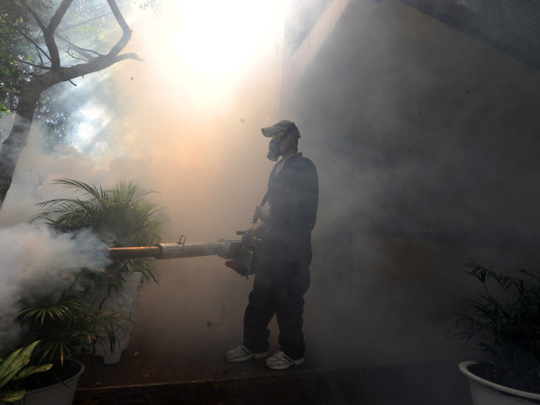
Geneva: Following are the latest on developments regarding the Zika virus (all times local):
4:45 a.m. (February 2)
The government of Honduras has declared a state of national emergency, saying it has recorded 3,649 suspected cases of Zika virus infections in less than three months.
Health minister Yolani Batres is urging Hondurans to clean up their homes and communities and remove outdoor water containers that serve as breeding grounds for the Aedes aegypti mosquitoes that can transmit Zika.
The health ministry says the government has reactivated the National Risk Management System to coordinate preventive measures against Zika. Thousands of teachers, students, parents and public officials have begun eradicating breeding sites around schools in the Central American country.
Monday's announcement came hours after the World Health Organization called the Zika outbreak in the Americans an international emergency.
4:15 a.m.
The president of the International Olympic Committee is expressing confidence there will be good conditions for athletes and spectators at the Rio de Janeiro Games this summer despite the explosive spread of the Zika virus in the Americas.
Speaking in Los Angeles on Monday, Thomas Bach praised the steps being taken to combat the outbreak. He also welcomed the declaration by the World Health Organization earlier in the day that the Zika outbreak is an "extraordinary event" that is an international emergency.
Bach notes that the announcement did not involve a travel ban and he emphasizes that the Rio Olympics will be held in August, during Brazil's winter when cooler temperatures can cut down mosquito populations.
Bach is in Los Angeles touring proposed venues in that city's bid to host the 2024 Olympics.
1:30 a.m.
The Brazilian health ministry is welcoming the World Health Organization's declaration that the Zika virus outbreak in Brazil and elsewhere in the Americas represents an international emergency.
In a statement released late Monday, the health ministry says the designation made earlier in the day will help countries around the world develop a coordinated effort to combat the virus.
The statement notes WHO did not suggest that people stay away from or stop doing business in areas with outbreaks of Zika, which is believed to be linked to microcephaly, a rare birth defect that causes abnormally small head size and brain damage in infants.
WHO is recommending that visitors and residents in affected areas, especially pregnant women, take measures to avoid being bitten by mosquitoes that transmit the virus.
12:15 a.m.
Brazil's health ministry says it will make it mandatory for local governments to report cases of the Zika virus.
A statement provided to The Associated Press late Monday says concrete steps will be taken beginning next week. Currently, mandatory reporting is not in place.
No vaccine or treatment currently exists.
Researchers say that to combat the virus, they need to get a better handle on the total number of cases in Brazil and several other countries with outbreaks. The virus is thought to have been introduced into Brazil during the 2014 World Cup.
Brazilian officials believe Zika infections may be linked to a high number of cases of microcephaly, a rare birth defect that causes abnormally small head and brain damage in infants.
11:40 p.m. (February 1)
The Brazilian president's chief of staff says it will take researchers between three and five years to develop a vaccine against the Zika virus.
Jacques Wagner told reporters Monday that Brazilian researchers are working with researchers in the United States.
In his words, "If we are really lucky, it could be three years. But it could be between three and five years."
Wagner made the estimate just hours after the World Health Organization declared the spread of Zika an international emergency. It was in line with previous estimates by health officials working to combat the spread of the virus.
11:00 p.m.
A U.S. travel alert has been issued for four more destinations because of the Zika virus.
Health officials on Monday added American Samoa, Costa Rica, Curacao (koor-uh-SOW') and Nicaragua to the list of places with outbreaks where travelers should take precautions against the mosquito-borne virus.
Because of mounting evidence linking Zika infections to a birth defect, the government recommends that pregnant women consider postponing trips to places on the list.
Previously on the alert list in Latin America: Bolivia, Brazil, Colombia, Ecuador, El Salvador, French Guiana, Guatemala, Guyana, Honduras, Mexico, Panama, Paraguay, Suriname and Venezuela. In the Caribbean: Barbados, Dominican Republic, Guadeloupe, Haiti, Martinique, St. Martin, Puerto Rico and U.S. Virgin Islands. Also: Cape Verde islands, off coast of western Africa" and Samoa in South Pacific.
___
10:45 p.m.
U.S. House members are asking government health officials for more information on the Zika virus.
The requests from top Republicans and Democrats on the House Energy and Commerce Committee follow the World Health Organization's declaration of mosquito-borne Zika as a global health emergency. The virus has been linked to birth defects.
The committee members asked officials from the Department of Health and Human Services, the Centers for Disease Control and Prevention and the National Institutes of Health for briefings on the disease. In letters, they asked for information on research, testing and available dollars to ensure the U.S. is prepared.
In a letter to the CDC, they asked if a travel warning could have been issued sooner.
___
9 p.m.
In Rio de Janeiro, a union made up of workers handling the Zika virus response on the ground is threatening to go on strike just as Brazil gears up to fight the Aedes aegypti mosquito that transmits the disease.
The union is demanding better working conditions, as well as uniforms, sunscreen and bug repellent for city workers going door-to-door in hopes of wiping out the mosquito.
Sandro Cezar is the secretary general at the city's SINTSAUDE union. He said Monday that the union's 7,000 workers will go on stage if Brazil's health ministry doesn't meet their demands by Thursday.
Cezar also warns that more than 220,000 other health workers could later join them in a nationwide stoppage.
___
7:30 p.m.
The World Health Organization has announced that the explosive spread of the Zika virus in the Americas is an "extraordinary event" that merits being declared an international emergency.
The agency convened an emergency meeting of independent experts on Monday to assess the outbreak after noting a suspicious link between Zika's arrival in Brazil last year and a surge in the number of babies born with abnormally small heads.
Although WHO Director-General Dr. Margaret Chan said there was no definitive proof that the Zika virus, spread by mosquitoes, is responsible for the birth defects, she acknowledged on Thursday that "the level of alarm is extremely high."
The last such public health emergency was declared for the devastating 2014 Ebola outbreak in West Africa, which killed more than 11,000 people.
WHO estimates there could be up to 4 million cases of Zika in the Americas in the next year.
___
1:15 p.m.
The World Health Organization has begun a crisis meeting considering whether the explosive spread of the mosquito-borne Zika virus - which is linked to birth defects in the Americas - should be declared a global health emergency.
The closed-door teleconference meeting of experts is considering whether international efforts to fight the outbreak should be immediately ramped up, WHO spokesman Christian Lindmeier said. The U.N. health agency last declared an emergency over the 2014 Ebola outbreak in West Africa. A similar declaration was made for polio the year before.
Such emergency declarations are meant as an international SOS signal and usually trigger increased money and efforts to stop the outbreak, as well as prompting research into possible treatments and vaccines.
Sanofi launches zika virus vaccine R&D project
In Paris, drug-maker Sanofi said on Tuesday that its Sanofi Pasteur vaccines division has launched a vaccine research and development project targeting prevention of the Zika virus.
As Sanofi led the vaccine field for viruses in the same family as Zika virus (ZIKV), with licensed vaccines against Yellow Fever, Japanese Encephalitis and, most recently, Dengue , it could leverage that experience in the hunt for a Zika vaccine, the statement said.
6 Zika virus cases in California
Six people in California have been diagnosed with the Zika virus in the past three years, state public health officials said Monday. All of the cases were contracted abroad.
California Department of Public Health Director Karen Smith said Monday that there is no evidence that mosquitoes in California are carrying Zika virus -- which experts think could be causing serious birth defects -- but advised that people take steps to avoid being bitten. There is no vaccine for Zika.
As of last week, officials have confirmed two cases of the Zika virus in Californians who were infected while traveling abroad in 2015. There were three cases in California in 2014 and one in 2013, according to officials.
State officials said the numbers will be updated Friday, and could go up. They would not specify the location of the cases, but L.A. County officials said last week that a young girl had been diagnosed with the illness in the county.
Public health experts became worried about Zika, which usually has no symptoms, when cases of microcephaly skyrocketed in Brazil after a Zika outbreak began there last year. The virus has been rapidly spreading, and cases have since been reported in more than 20 countries in the Americas.
On Monday, the World Health Organization declared the spread of Zika virus an international public health emergency.
So far, all cases in the United States have been in people who traveled to a country with an outbreak.
Zika isn't contagious. It can be transmitted only if a mosquito bites a person who has the virus in his or her blood, and then bites another person.
Because of the suspected link between microcephaly and Zika, authorities are recommending that women who are pregnant consider postponing travel to places where the Zika virus transmission is ongoing, and that women who are trying to become pregnant talk to their doctors about the risk of infection.
The mosquitoes that transmit the virus are not native to California, but have been found here in the last few years. In total, they've been detected in 12 of the state's 58 counties, officials say.
The Asian tiger and the yellow fever mosquitoes -- Aedes albopictus and Aedes aegypti, respectively -- are about half the size of normal mosquitoes and have black-and-white stripes. Unlike mosquitoes more common to California, which usually come out in the evening, these mosquitoes bite during the daytime.
"Although no one has contracted Zika virus in California, mosquito bites can still be harmful and the public should take steps to protect themselves," Smith said in a statement.












